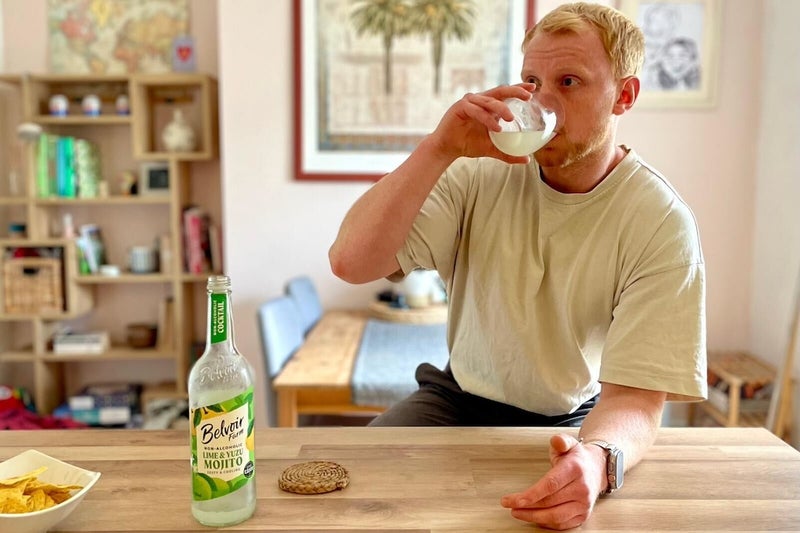Products that enhance the uptake of this neurotransmitter are burgeoning - including drinks that mimic the effects of alcohol, without the hangover. Here’s what happened when I tried them. “Chinese medicine.” “That weird Hungarian liqueur.” “Something my grandad would drink.” The taste test is not going well. Dry January is over and we’re hitting the bottle, but this is not alcohol we’re drinking. It’s theoretically the next best thing: Sentia Black, “a unique blend of functional botanicals, designed for focus and conviviality,” reads the blurb.
![[Steve Rose]](https://i.guim.co.uk/img/uploads/2022/08/26/Steve_Rose.png?width=75&dpr=1&s=none&crop=none)
We’ve been trying it neat, but once you mix it with tonic water it becomes much more palatable – “festive and grownup”, as one of my test subjects puts it. Taste aside, though, does it work? The conversation is certainly free-flowing, but whether it is more “focused and convivial” than it would have been without the Sentia is hard to say. None of us end up dancing on the table or spoiling for a fight, at least. Nor does anyone wake up with a hangover the next morning, so there’s that. Mind you, it is £32 a bottle.
![[A bottle of Gaba capsules.]](https://i.guim.co.uk/img/media/676e6ea6d1fa41ab6195ed6e0361de2e31d38105/1543_339_2647_3279/master/2647.jpg?width=120&dpr=1&s=none&crop=none)
The active ingredients in the drink have been chosen because they “stimulate the release of Gaba” – a neurotransmitter that slows down the brain – gently mimicking what alcohol can do to extreme levels. Gaba is short for gamma-aminobutyric acid and it’s being talked of in terms of not just alcohol substitution but a whole range of health applications. It is often associated with sleep, relaxation and anxiety, but it also has a role to play in epilepsy, Parkinson’s, blood pressure, seizures, memory and much more. As such, Gaba has become something of a buzzword in health and wellness circles, which inevitably means there is a lot of confusion and misinformation.
![[Three bottle of different colours of Sentia – gold, red and black]](https://i.guim.co.uk/img/media/e3b7bfb6de1964f586dabe84eb04ce076159c6cd/1806_10_4781_6890/master/4781.jpg?width=120&dpr=1&s=none&crop=none)
Gaba itself is a naturally occurring substance. Our bodies can make it, and it’s present in common foods, with higher concentrations in cruciferous vegetables such as broccoli and kale, sweet potatoes, fermented foods such as kimchi and tempeh, and certain herbs. The sale of pure Gaba (it can be synthesised by fermenting food) is prohibited in the UK and EU due to concerns over potential for misuse, but it’s legal in the US and Japan, where you can buy myriad Gaba supplements, with dosages ranging from 10mg to 750mg, not to mention Gaba-enhanced chocolate, gummies, drinks – and it doesn’t stop there. But its uses and effects are far from straightforward.
![[Prof David Nutt in a lab coat in front of a bar or lab, holding a bottle of Sentia.]](https://i.guim.co.uk/img/media/42f4c34f28868158c2897aa85f18f6bfbceea3fe/0_0_1886_1266/master/1886.jpg?width=445&dpr=1&s=none&crop=none)
“Gaba is the off switch of the brain,” says the neuropsychopharmacologist Prof David Nutt, of Imperial College London, who is also one of the creators of Sentia. At the most basic level, brain activity consists of billions of neurons turning on and off, he says. “The turning on is glutamate; the turning off is Gaba.” This is why Gaba has a connection with calming. “When we go into a social situation with strangers, the social parts of our brain are set to ‘slightly anxious’ because it’s better than being overconfident,” says Nutt. “What alcohol does, and what Sentia does, is enhance the Gaba there to take away that anxiety, so you can be as social as you really want to be.”.
![[Mark Wong, the founder of Impossibrew presenting an idea in Dragons’ Den – wearing a white shirt and glasses]](https://i.guim.co.uk/img/media/dc3551eb813a1c717e02dd5eebec9a2ddfacd328/221_5_2094_1257/master/2094.jpg?width=445&dpr=1&s=none&crop=none)
Sentia, which launched in 2021, seeks to mimic the first stage of drunkenness – the relaxed, “convivial” feeling you might get after one or two drinks – but without leading to subsequent phases: euphoria, loss of judgment, pain reduction, memory loss, dependence. You don’t get more faux-drunk the more Sentia you drink; you just remain in that “sweet spot” of sociability, it’s claimed. “We are not replicating alcohol,” says Nutt. “We don’t want people to get drunk and addicted and hungover.”.
![[Two hands clinking a glass full and a tin of Impossibrew in centre of image]](https://i.guim.co.uk/img/media/5e9f2937d72814dfdf5ff441a522e215db9dccaa/0_52_1800_1080/master/1800.jpg?width=445&dpr=1&s=none&crop=none)
Nutt says he was led down this path by first-hand experience. “I spent most of my first 20 years as a doctor trying to treat people with alcohol withdrawal, alcohol craving, alcohol brain damage.” According to the latest statistics, alcohol-related deaths in the UK hit a record high in 2023, exceeding 10,000 for the first time. Meanwhile, we are increasingly turning off alcohol. A recent UK survey found that 43% of 18- to 34-year-olds and 32% of 35- to 54-year-olds no longer drink it at all. So there is clearly a place for drinks like Sentia.
![[Steve Rose holding up a drink with bottles and veg on a table in front of him. Orange background]](https://i.guim.co.uk/img/media/9f76006dd7089b99f126666ee20384df9b371ffa/0_743_10000_6757/master/10000.jpg?width=445&dpr=1&s=none&crop=none)
Nutt was fired as a government adviser on drug policy in 2009, for arguing that some illegal drugs, such as ecstasy, LSD and cannabis, were less harmful than legal ones including alcohol and tobacco. He has been researching alcohol alternatives ever since, and in 2019 he co-founded GABA Labs, which makes Sentia. “There are small molecules that do mimic the effects of alcohol. We looked at those, and we found they were complex, difficult and expensive. So we started making our own molecules.” It is a challenging and expensive process, he says, but “in the last 10 years, we’ve made 50 molecules that target the Gaba system as we want.”.
They also studied plants and herbal remedies associated with calmness and relaxation in western, Chinese and Ayurvedic traditions – valerian and ashwagandha, for example. Sentia is a mix of natural ingredients, some for Gaba-enhancement, some for flavour, including blackberry juice, aronia, magnolia, linden, passionflower, liquorice, ashwagandha and more – plus what is described on the label as “GABA Labs proprietary blend” – which includes those synthetic Gaba-targeting molecules Nutt was talking about.































